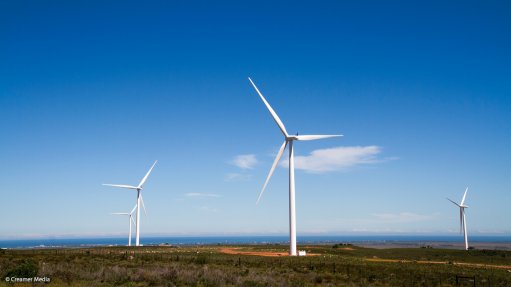
Photo by: Duane Daws
Alternative funding models could be expected to begin coming to the fore in South Africa’s renewable-energy sector as the market becomes more competitive and domestic development finance institutions (DFIs) begin scaling back their direct involvement in projects.
Speaking to Spanish investors during a recent mission to South Africa, Industrial Development Corporation (IDC) industrial infrastructure head Lizeka Matshekga reported the State-owned financier is shifting gears in relation the Renewable Energy Independent Producer Power Procurement Programme (REIPPPP).
The IDC has hitherto played a major role in developing the industry, having supported 24 projects with financial commitments totalling R14-billion.
In total, 92 renewables projects, with a combined nameplate capacity of 6 243 MW, have been procured since the announcement of the first REIPPPP preferred bidders in late 2011 and the Department of Energy has indicated that the programme has resulted in investment commitments of R193-billion.
Matshekga indicates that the IDC began paring back its involvement during the fourth bid window of the REIPPPP and that it intends increasingly refocusing its resources towards the localisation of the components used in renewable-energy projects.
“We will still play a role, but not at the level of the past,” she explains, adding that the shift is reflected in the consolidation of the green industries under the more broadly focused industrial infrastructure business unit. The unit aims to support the infrastructure needs of the mining and metals, chemicals and pharmaceuticals and agroprocessing value chains both in South Africa and the rest of the continent.
This shift in strategy could have significant consequences, particularly in light of Energy Minister Tina Joemat-Pettersson’s decision that a further 6 300 MW of renewables capacity be procured beyond the projects procured under previous government determinations.
Standard Bank renewable energy, power and infrastructure head Rentia van Tonder says that at least another R160-billion will have to be invested by independent power producers to meet the additional 6 300 MW determination.
“I cannot see the commercial banks doing that on their own,” Van Tonder argues. “The introduction of Basel 3 acts as a constraint on the amount of long-term debt South African banks can take on their balance sheet and this effect will indirectly support the development of a secondary market.”
Van Tonder believes the DFIs still have a significant direct role to play, particularly in providing equity finance, but also in supporting black economic empowerment community development and funding for black industrialists in the sector. “To grow the renewable-energy sector and take it to the next level, I believe everybody will need to play their role.”
However, in light of the changing environment she says different models could be considered in future, including options that seek to tap the debt capital markets.
One possible alternative is the creation of so-called ‘yieldcos’, which would be publicly traded corporations that hold operating assets that generate long-term, low-risk cash flows, which are distributed to investors as dividends.
“The sector has grown to the point where we have to look at alternative funding models and, as a bank, we are looking at various structures,” Van Tonder explains.